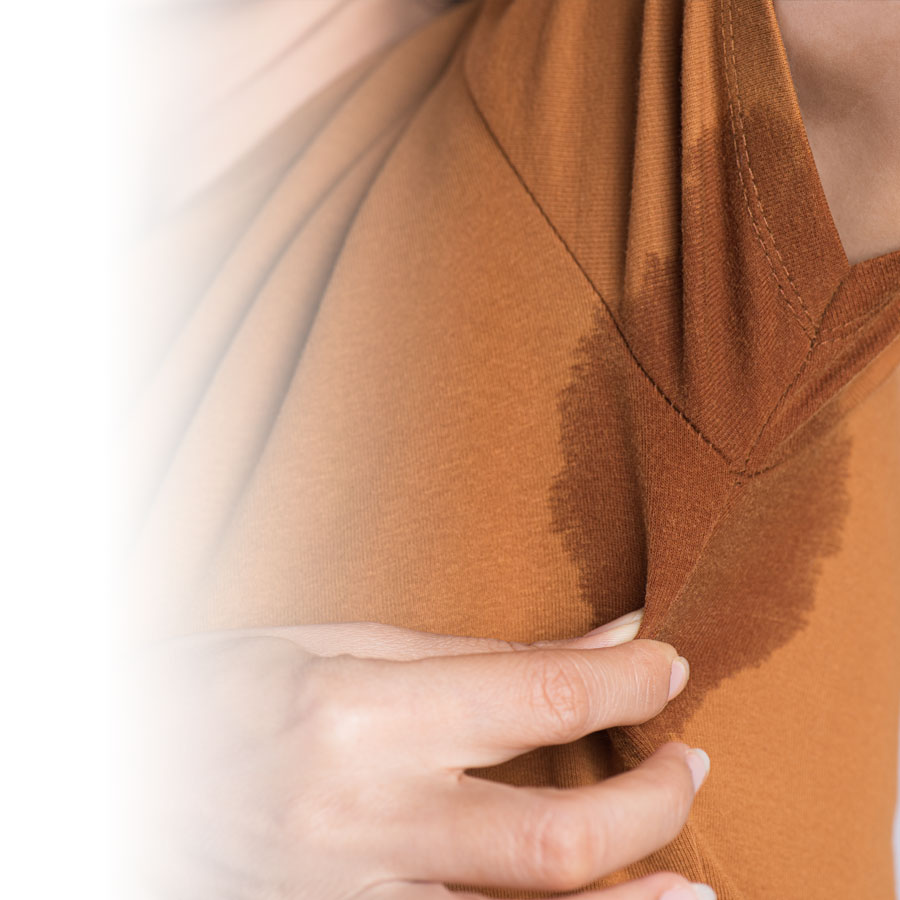Whether you suffer from it or are a witness to it, excessive sweating often causes embarrassment and discomfort. Find out how to deal with it.
WHAT IS HYPERHIDROSIS?
Hyperhidrosis is a scientific term that describes excessive sweating (or perspiration). Perspiration is a natural way for the body to evacuate excess heat. The sudoriferous glands secrete sweat to ensure thermoregulation. Most people sweat to varying degrees each day. This action is observed more frequently during the following conditions or specific situations: physical exercise, stress, strong emotion, high temperatures, etc.
In the case of hyperhidrosis, sweat is produced in an inappropriate, disproportionate, and random way, without any actual connection to the body's needs. Hyperhidrosis can be diffuse (or generalized), but it is usually manifested in the hands, feet, armpits, face or skull, causing embarrassment and discomfort.
Hyperhidrosis can virtually become a disability in everyday life and have an impact on the personal, social, and professional lives of individuals affected by it. These individuals may tend to restrict contact with others or avoid certain situations because they lack confidence.
WHAT CAUSES HYPERHIDROSIS?
Excessive sweating rarely results from a serious medical condition. It is generally explained by a hereditary predisposition, and manifestations sometimes begin during childhood or adolescence. It is estimated that 1 to 3% of the population is affected by hyperhidrosis.
Excessive sweating can also be attributed to other causes, for example:
- an illness (e.g. hyperthyroidism)
- an infection (e.g. tuberculosis)
- a hormonal imbalance (e.g. menopause)
- an injury (e.g. trauma to the spinal column)
- taking medication (e.g. antidepressants)
HOW CAN HYPERHIDROSIS BE CONTROLLED?
It is usually impossible to permanently be rid of hyperhidrosis, unless the cause can be eliminated. It is possible to decrease sweat production with the use of antiperspirants. However, those available on the market are not always sufficient to correct the situation. Most of them contain an active agent called aluminum chlorohydrate or zirconium.
Stronger and more effective antiperspirants against excessive sweating are available at the pharmacy without a prescription. These types of products contain varying concentrations (e.g. 6.25%, 12% et 20%) of aluminum chlorohydrate. It can sometimes be found on store shelves, but may also be stored behind the pharmacy counter.
These products are usually applied to affected areas at bedtime, after having cleaned and dried the skin well. The skin most also be well cleaned the following morning after each application. A daily application is advisable in the beginning. Once the problem is better controlled, the product can be applied less frequently, approximately once or twice a week. Consult your pharmacist for optimal and safe use of the product.
Other treatment methods can be considered in refractory cases. Speak to your doctor for additional information.

SOME ADVICE
In conclusion, if you are affected by hyperhidrosis, it is advisable to:
- maintain excellent personal hygiene
- reduce your consumption of foods or drinks that promote perspiration (e.g. spices, caffeine, alcohol)
- wear loose-fitting clothes made of natural fibers (e.g. cotton)
- clean your clothes properly and regularly, and let them dry completely
Speak to your pharmacist for additional information about hyperhidrosis.

